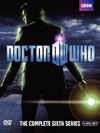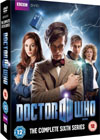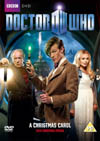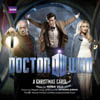DVD Extras include:
The other half of the story is Moffat's usual song and dance. He meddles with time, throws a romance out of sync with one person aging while the other does not, puts in some frights that don't quite have any reason to be there other than to be scary, and lets everything work out all right. Sort of. Most of this has also been tried and tested in previous episodes, and it continues to intrigue controversially and satisfy emotionally.
The Orbit of the Crystal FeastWell, thank goodness we get to go to an alien planet. Regular readers of my reviews will recall how strongly I advocate for that, particularly to reward our travels with discoveries of other cultures and ways of looking at life. In a Christmas Special, perhaps we could look at the holiday traditions of an alien culture.The trouble with today's unnamed planet, however, is that it isn't all that alien, and borrows all its imagery from very Earthly sources, cutting and pasting it into only a slightly different collage. Why Dickens' own industrial era is reproduced so faithfully on a futuristic colony in space is a scientific hilarity, but of course it's nostalgic, isn't it? Perhaps the best idea - that of fish in the atmosphere - gets the worst realization, in that there is nothing alien about these creatures. For example, their fins could be larger and shaped like wings had they cut their imaginations loose with the freedom you get from alien planets. Instead, they look exactly like Earth fish. Disappointing. And in fact, investigations of our own seas here on Earth often discover countless creatures beyond the imagining. One of the Confidential featurettes later in the season features Arthur Darvill encountering real sharks, and as a buff of the exploration element in sci-fi, I found it more gripping and with better defined emotional stakes. Oh well. Much of the most poetic dialogue betrays very Earthly and British thinking as well. Winter solstice is fundamentally an astronomical marker, based on things like a decent tilt of the Earth's rotational axis, the fact that this rotation is independent of our orbit around the sun, and the fact that our rotation is not "tidally locked" to the sun's surface like the planet Mercury (or Svartos), which has no day/night cycles. In fact, just go to the other end of our own planet, like Australia or New Zealand, where Christmas Solstice marks the brightest day of the year, and you get an idea of how non-universal some of these concepts are, and how much variation exists to be explored. The planet Uranus and its large moons get a winter solstice with an entire hemisphere in the dark all day and all night, and 42 Earth-years later comes the summer solstice where that same hemisphere gets sunshine (albeit faint) all day and all night. On a completely new planet, it's all up for grabs, limited only by imagination. How long is a year on Sardicktown's planet? If Christmas solstice came every 3 Earth-months or so, I wouldn't blame old Kazran for getting sick of it. I'd love more details on this planet's orbit and climate and winter solstice cycle, and more on "The Crystal Feast" that was originally celebrated here. One odd cast-off mention doesn't really satisfy. However, if Moffat wants to save the real fruits of his imagination for season 32 proper, and just do Christmas Specials as blatant pinches from other sources, I don't mind so much either. I'm not a particular fan of mandatory Christmas episodes every year. My favourite is still the "Sliders" season three episode "Season's Greedings".
Memory TimeTime travel is not this story's strength, with Moffat really going wild with the outdated "single rewriteable line". And no, he doesn't get to excuse it just by having Amy dance around citing "Time can be rewritten" like an airhead. Most of what the Doctor does in this story would help our scrooge's doubles in parallel/branching universes, not rewrite the one he meets originally in the "present" time, whenever that is. And after all the Doctor's excessive independent time jumps in this story, which flow off into parallel/branching universes, he'd be hard pressed to know which doubles of Amy and Rory he ended up saving and taking home at the end.By the way, how many of you out there chimed with Moffat's suggestion that Dickens' original "A Christmas Carol" was already (kind of) a time travel story? Technically, it isn't; it's more of a time observation thing. Scrooge looks at past, present, and possible future, and as a result of what he's seen, decides to change his destiny by making new choices in the present. The crux is entirely in "the now". Moffat's story may fail space/time/choice mechanics, but Charles Dickens aces it with flying colours. Just to be clear. Moffat's only decent wiggle room is in the idea of memory, but he doesn't confine himself to what would work in that regard. We go beyond that to have photographs and broken sonic screwdrivers turn up as well, while isomorphic controls do not get rewritten along with everything else. It's as if Kazran and the controls followed separate timelines that suddenly slam together at the end of the story. The adventure turns out about as ridiculous as "The Pandorica Opens" in that regard, but here it is at least self contained. Okay, whatever, Moffat gets no great points here.
A Character StoryWhat works is the human emotional element. And both Dickens' masterpiece and Moffat's usual arcs contribute to that and complement each other, even if it's a bit of a rerun of "The Girl in the Fireplace" and "The Eleventh Hour".Michael Gambon's portrayal of the elderly Kazran Sardick is the centerpiece holding the story together - completely enjoyable all the way through and receiving good support from the younger actors playing him at earlier ages and from Katherine Jenkins playing Abigail. Matt Smith is enjoyable as usual as the Doctor, and gets to make a highly unique entrance that I thoroughly liked on this occasion. One infers that the TARDIS is VERY busy in this story, but it does so mostly in the background - which is pretty much a necessity and an ideal this time around. You have to wait for the very end to see a trick-dissolve dematerialization on screen. I'd have added one more materialization and lengthened the sequence when 12-year-old Kazran and Abigail get their first trip in the TARDIS, 'cause you never know who might be watching this as their first Doctor Who episode ever, but it's not critical this time around, just my preference.
The whole set-up with Amy and Rory on a crashing spaceship added to scrooge's isomorphic controls all seem like a bit of overkill just to motivate the character story though. If the Doctor has as much power as he does to jump all over time for days on end, surely he could help the ship down more directly. If you want to do the scrooge thing, do it because it feels so good character-wise, not because of crashing ships. Oh well. I guess this all reflects today's excesses of energy and pace on TV. I must say I got dizzy each time we got a scene on board the ship, and by the time we approached the end of the show I dreaded the setting. Of course, there's excellent payoff there once the music starts, but I think a somewhat steadier camera on the ship during the earliest segments could have made the complete piece flow much better and made the much more relaxed pace of the scrooge-arc seem less like it was ignoring the urgency of the ship's situation. Speaking of pace, I'm not impressed to see the cast rattle through exposition so fast and carelessly. There is potential for it to have some charm if done right, but I think it's done excessively. There is a line attempting to explain why the Doctor doesn't use the TARDIS to help the ship (either with a tractor beam thing, or by getting onto the bridge to fix something, or just to evacuate everyone into the TARDIS). The line is "The TARDIS can't lock on." Okay, that doesn't really explain enough to convince me to invest in going the long way around through a scrooge arc. Perhaps the line is buried in Smith's rambling to try to escape scrutiny. Amy and Rory have little to do in this one. Are they making the smart move of double-banking the Christmas special, as season 19 did with "K9 & Company"? Later stories suggest not. It just seems a bit bizarre to finally include Arthur Darvill's name in the opening titles along with Smith and Gillan, and then to give him and Gillan so little to do in the story. I wouldn't have minded seeing more of them in a Christmas Special - however, if they're going to be occupied with anything approaching a proper honeymoon, you can leave that off-screen, as was so thankfully done here. And I am pleased that this was not the adventure that the closing dialogue of last season had led me to anticipate. This was better. I'm not sure I understand the logic of having Abigail's countdown numbers on her cryogenic casket though. My guess to their meaning on first viewing was the number of times she could be safely frozen and/or unfrozen, before the chamber could no longer overcome the problem of organic cells ripping apart as the water inside freezes and expands, although even that explanation isn't watertight as we shall see. At any rate, you'd think the numbers would pertain to her time in the chamber, yet instead it's supposed to show us how much time she can spend outside the chamber, which would make more sense if shown on a watch on her wrist or something. The logic of casket numbers breaks down best when you remember that the original reason to bring her out of the casket was to put the shark in. So what happens when someone or something else takes a turn in the chamber? Does it still try to keep track of Abigail on the outside, or does it pay attention to its new inhabitant instead? What if that person isn't sick? And besides all that, you'd think someone dying of a disease with only eight days left would not look so picture perfect all the time, or not have the perfect voice, or not have some serious emotional issues that coincided with bringing the disease on in the first place. Perhaps it is best that no tangible evidence to support the exact time of her death is ever brought on screen. I think she was misdiagnosed, either through incompetence, or conspiracy to convince her to become collateral for the loan - which would firmly place Kazran as the creator of his own misery to buy into such a feeble lie in the first place. When all is said and done, you're better off looking to the hilarious animated series "Futurama" (and the pilot episode is great for this) to see countdown numbers on cryogenic caskets that actually make sense in pertaining to their inhabitants only while the inhabitant is in the casket's care. That said, I think it's great imagery to have frozen family members as collateral for loans - a nice sci-fi update on the "bah humbug" of Scrooges everywhere, and another good reason to put usury permanently to rest.
International Titles:Deutsch: "Fest der Liebe"Magyar: "Karácsonyi ének"Français: "Le Fantôme des Noëls passés"Русский: "Рождественская песнь"Italiano: "Un canto di Natale"This story has become available on DVD and Blu-ray. Click on the Amazon symbol for the location nearest you for pricing and availability:
This story is also available in a single episode volume with unique bonus features. Click on the Amazon symbol for the location nearest you for pricing and availability:
Comments on this article are welcome. You may contact the author from this page:
|
|||||||||||||||||||||||||||||||||||||||||||













